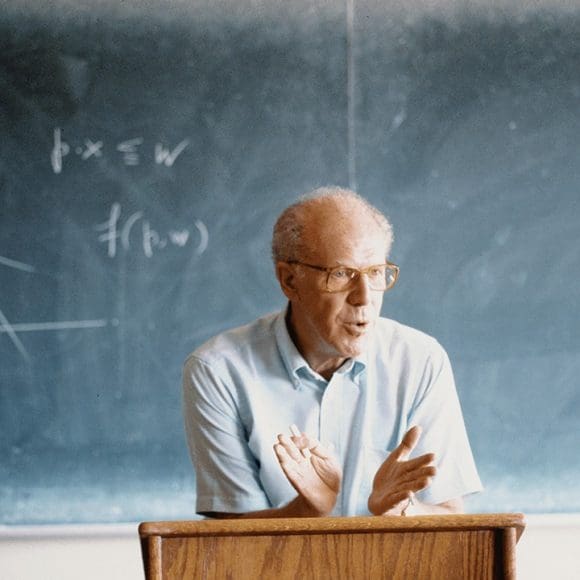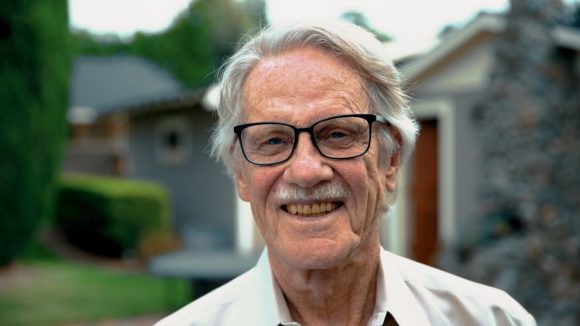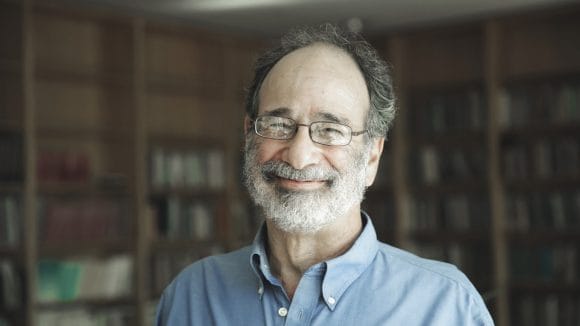Gérard Debreu
Nobel 1983 | How does a market economy work?
“Among all the Nobel Laureates in Economics, I have done the most abstract work,” Gérard Debreu said in 1985, two years after he’d received the Nobel Prize for his theory of economic equilibrium. Though he chose to stay a theorist all his life, and didn’t care much for real-world applications of his work, his mathematical models provided the basis for generations of economists to explore how individuals and companies interact and how a market economy really works.

Gérard Debreu
Gérard Debreu
The Sveriges Riksbank Prize in Economic Sciences in Memory of Alfred Nobel, 1983
Why did Gérard Debreu transition from mathematics to economics?
Why did Gérard Debreu transition from mathematics to economics?
When France entered World War II in September 1939, Debreu was an 18-year-old boy who had just started his studies in mathematics. One year later, the French territory was divided into a northern zone under German military administration and a free zone in the south. Debreu travelled in both zones but eventually decided to study in Paris. Despite the Nazi occupation the country’s capital was under, he concentrated on his studies at the university where he enjoyed what he referred to as the “superheated intellectual atmosphere” in his Nobel autobiography.
He served briefly in the French occupation forces but back at university, his interest in economics increased significantly. He read the theories of Léon Walras, who had been a pioneer in the development of general equilibrium theory and followed in his footsteps. “I’d discovered the subject that fascinated me,” Debreu said. “In which I perceived that there was a great deal of work to do.”
Why do people’s economic decisions not lead to complete chaos?
Has this question inspired you?
Has this question inspired you?
Get the latest Nobel perspectives delivered to you.
How did Gérard Debreu's move to the United States influence his research on the general equilibrium theory?
How did Gérard Debreu's move to the United States influence his research on the general equilibrium theory?
When he started his academic career, mathematics was becoming increasingly popular in economic theory. A fellowship enabled him to visit Harvard University, the University of California, Berkeley, Columbia University and the University of Chicago. This allowed him to familiarize himself with developments France had not been exposed to during wartime. The Cowles Commission for Research in Economics in Chicago made an irresistible offer to Debreu so he decided to stay in the US and in the years that followed he devoted most of his research to the subject that had led him towards economics in the first place: general equilibrium.
How did Gérard Debreu and Kenneth Arrow prove the existence of general equilibrium?
How did Gérard Debreu and Kenneth Arrow prove the existence of general equilibrium?
To understand the idea of general equilibrium, one must look at one of the fundamental ideas of microeconomics – supply and demand. With demand referring to how much a product is desired by consumers and supply being the amount of a product the market is offering, the price will, in theory, vary until both sides are correctly balanced. In this case, the market reaches an economic equilibrium. As economists would say, the market clears.
At Stanford Debreu worked alongside fellow Nobel Laureate Kenneth Arrow. The two were looking to provide mathematical proof that general equilibrium actually exists.
“The economic system is highly unified, what happens in any place within an economy has repercussions affecting the entire economy,” Arrow explained. “An innovation in one field may increase the demand for certain resources and therefore draw them away from others. One can’t understand a single industry without reference to remote connections with other industries.”
Debreu and Arrow were able to prove their theory, showing that prices exist that brings markets into equilibrium.
A life’s lesson: Finding something you believe in
Though interested in politics, Debreu refrained from commenting too often. After he won the Nobel Prize, he realized the greater influence he could have. “Time has always been scarce,” Debreu. “But I try not to waste it. I try to have purpose.”
In the 1980s, the Committee on Human Rights at the National Academy of Sciences sent him to Chile. “I have felt a greater obligation to talk about human rights,” he explained. The delegation he was traveling with investigated whether scientists, engineers and medical professionals were facing torture under the military dictatorship led by Augusto Pinochet.
“Human rights activities can be very frustrating,” he said “Often one has the impression that one does not achieve much but it’s not fully justified. There are cases in which one obtains results.”
Why can equilibrium never be reached in reality?
Why can equilibrium never be reached in reality?
Debreu was occasionally asked to serve as a consultant but declined every offer. It never occurred to him that his opinion should be considered important outside of academia since he focused on research rather than applications. He knew that his formal theory was only a first approximation to understand economic activity. Market equilibrium could only ever be reached theoretically, as prices for goods and services were constantly changing. Debreu left it to other economists to develop and apply his theories to the real world. He felt that his mathematical modeling should provide a basic language for the work of others.
And it did. Economists that came after Debreu pointed towards the importance of his work as a crucial basis for their research, most notably Nobel Laureates Peter Diamond, Robert Aumann and Daniel McFadden.
The responsibility that comes with a Nobel Prize
Has this question inspired you?
Has this question inspired you?
Get the latest Nobel perspectives delivered to you.
What do students need to learn?
What do students need to learn?
For Debreu, leaving his comfort zone was not an easy thing to do. Though he adored his grandchildren and enjoyed hiking with his wife, he didn’t speak in great detail about his private life. His human rights work was one of the few things he liked to talk about outside his research, as was his commitment to university education and his students. “Perhaps the greatest service I can render to them is to communicate a sense of enthusiasm and excitement,” he said.
The young have a tremendous privilege. There are many opportunities open to them. What I think is most important is for them to find something in which they believe and then give that their full energy, of which they have so much.
Why do countries have to find better ways to grow?
Why do countries have to find better ways to grow?
Hear Michael Spence's view on how countries can grow sustainably while having a long-lasting positive impact.
People Also Asked
Has this question inspired you?
Has this question inspired you?
Get the latest Nobel Perspectives updates delivered to you.


